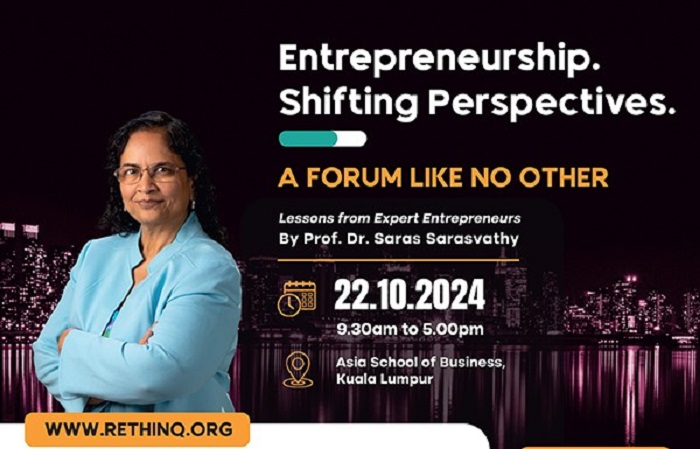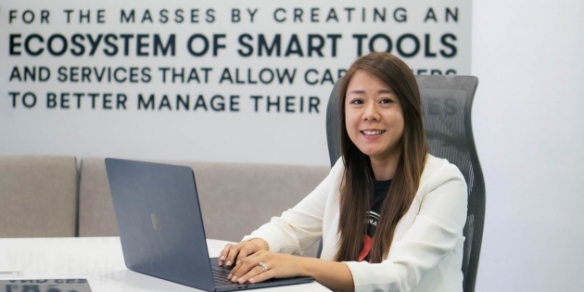RethinQ Entrepreneurship will challenge your notions of what makes for a successful entrepreneur.. does even Elon know?
By Karamjit Singh October 20, 2024
- Success/failure of a venture is completely different from success/failure of the entrepreneur
- High failure rates of ventures shows traditional entrepreneurship education is not sufficient

The term ‘Effectuation Theory’ doesn’t exactly roll off the tongue. Nor will you find a single startup founder, post a funding round, excitedly declaring, “We’re going to strengthen the talent pool, double down on existing markets, launch in X market, enhance the platform, invest in marketing, AND, I’m going to enroll in a program to improve my entrepreneur skills (be it on Effectuation Theory or anything else).” That just does not happen.
So when Dhakshinamoorthy Balakrishnan or Dash reached out to me about the topic and how his search for more meaningful relevance in the world of startup entrepreneurship (readers will recall he used to be a pillar of the startup ecosystem in Malaysia) had led him to be convinced that the answer to Malaysia creating a pool of stronger founders and startups was to introduce the Theory of Effectuation and understand how its application to their ventures can really help them - well, I still wasn’t convinced. Even though he had already decided he was going to bring the leading expert in this space, Prof Saras Sarasvathy, to Malaysia for a forum on Tues, 22 Oct.
This, even though Dash has built a strong cache of social capital in his career. But as they say, timing is everything and when reflecting on my chat with Dash and my scepticism that exposing our ecosystem to the theory of Effectuation could move the needle, I recalled a recent conversation with Dr Hari Narayanan, CEO of Penang Skills Development Corp.
A seasoned C-suite leader with over two decades of leadership and management experience, including six years as managing director, Motorola Solutions Malaysia, Hari said something that really struck me. “Over my career, I have noticed that it has never been about the technology, but rather leadership that differentiates companies that succeed in the market.”
So maybe there was something here. From the website effectuation.org I found that effectuation is a logic of entrepreneurial expertise that both novice and experienced entrepreneurs can use in the highly unpredictable startup phase of a venture to reduce failure costs for the entrepreneur.
What intrigued me further was the fact that Effectual theory is a type of problem solving that was developed from a cognitive science-based study of 27 founders of companies ranging in size from US$200 million to US$6.5 billion conducted by Sarasvathy.
It turns out, what makes great entrepreneurs isn’t genetic or personality traits, risk-seeking behaviour, money, or vision. Effectuation research has found that there is a science to entrepreneurship and that great entrepreneurs across industries, geographies, and time use a common logic, or thinking process, to solve entrepreneurial problems.
So, maybe Dash was on to something. And that is how I found myself on a late weekend night chat with the ebullient Sarasvathy, the Effectuation guru herself.
Officially she is a faculty member at the UVA Darden School of Business in Strategy, Entrepreneurship and Ethics at the University of Virginia where she teaches MBA and doctoral courses in entrepreneurship.
While she has a long resume, it would be remiss of me if I do not mention that Sarasvathy is the recipient of the 2022 global award for Entrepreneurship Research, said to be the highest recognition for research in the field of entrepreneurship. It is awarded by the Swedish Entrepreneurship Forum and the Research Institute of Industrial Economics (IFN).
Confession of an editor
Confession. I am reluctant to interview academics, especially those who have made a name for themselves outside of the classroom. They just know their subject matter so well and can answer questions till the proverbial cows come home. And, unlike startup founders, they love tough questions.
And so it was that I lay out my skepticism that a relatively little-known theory about entrepreneurial expertise can grab the attention of entrepreneurs in Malaysia, not when the hot leadership discussion in the startup world currently is about ‘Founder Mode’ as offered by Paul Graham, one of the most respected names in the Silicon Valley.
Sarasvathy laughed. “That’s like seven questions in there.” Predictably she didn’t break a sweat addressing my skepticism. “Let me break that down into three parts,” she began.
But before this, I wanted to understand her motivation for wanting to research successful entrepreneurs, though she prefers to call them ‘expert entrepreneurs’, for her doctoral dissertation. Turns out, the roots to her interest in wanting to understand what makes successful entrepreneurs the success that they are, stems from her own journey as a serial entrepreneur, being part of the founding teams of five different ventures across three continents.
After her fifth venture was destroyed by flooding, she took a deep interest in the field of entrepreneurship which saw her embark on a Masters followed by a PhD right after, both in the US. It was out of her dissertation on what made successful entrepreneurs the winners that they are, that the theory came out.
But first she corrects me, teacher style. “Everyone tells me I came up with a theory, but the fact is that I did a big piece of research on the experiences of what I call expert entrepreneurs, out of which the theory came,” she explains.
That took three years with Sarasvathy publishing the theory paper as she calls it, in 2001. “The whole idea behind my research was to try to understand, what is it that entrepreneurs learn through their experiences, that we can also learn and then teach,” she said.
This was not as easy as it sounds as it took her time to understand how to teach the topic right. “It's not a simple matter that you have some finding from research and then you teach.”
Not one piece of research is enough and so she continued her research into expert entrepreneurs while developing materials to teach. “A textbook came out in 2011 but between 2001 to 2011 we were continuing to gather data, do research and develop material with all the case studies,” she explained.
That’s a lot of work to really understand and properly teach the key aspects of Effectuation leadership. This told me how seriously she took her work and how determined she was to try and get at the essence of what made ‘expert entrepreneurs’ so successful in order to then be able to help others through her classes.
Does anybody know what makes for a successful entrepreneur? Does Elon?
Now, even though we were not chatting face to face, it was a video call, but she anticipated my next question. (Have to work on my game face.)
“The question is not whether my theory is better and therefore I can produce successful entrepreneurs. That is the wrong question. Does anybody know this?”
You pick the most successful entrepreneur, say the founders of Airbnb or Elon Musk. Do they actually know, and can they create the next success (in others)? The answer is No, she stresses.
Then I got the student treatment. “Now I'm going to treat you like a student for a minute. Think deeply about that. Why is that?”
According to her, it is because the success or failure of the venture is completely different from the success or failure of the entrepreneur. “In fact, I teach my students that the most important thing you want to learn if you want to be a successful entrepreneur is how to fail. And then, you know, build on a whole bunch of small failures, a whole bunch of small successes, so that you as an entrepreneur, over time, will be successful. So we have done quite a bit of work on really unpacking these relationships,” she said.
“Effectuation provides an alternative approach focused on learning from failures and accumulating small successes over time.”
And that is what participants at her coming forum on Tuesday, ‘RethinQ Entrepreneurship – Build Effectual Entrepreneurs. Build Enduring Companies’ will learn about.
It is going to be very different from what one would expect from attending a typical forum on entrepreneurship. Will be totally worth your time to have your typical understanding of what makes for successful entrepreneurship to be shaken and challenged by Sarasvathy.
It has all been worth it for Sarasvathy as well who believes her work is also very relevant in the world of entrepreneurship and startups as she is convinced that the venture funding model, with its typical 10% success rate, broken.
“The US has the oldest and most successful venture capital market in the world. You would think they know something about building a successful company, right? Wrong, because their failure rate is nine out of 10. But entrepreneurs will routinely ask you to introduce them to VCs.”
She contends that that the high failure rates of ventures, even those backed by venture capitalists, shows that traditional entrepreneurship education is not sufficient. She has something more valuable to offer.
Make the time. Attend RethinQ Entrepreneurship.
DNA is an ecosystem partner for RethinQ Entrepreneurship. You can still get tickets here. You can listen to an interview Prof Sarasvathy
Related Stories :


